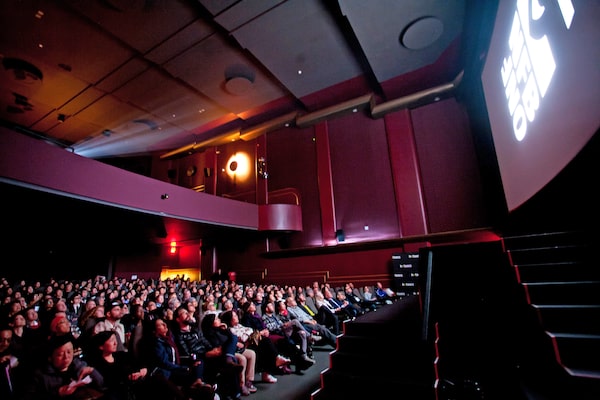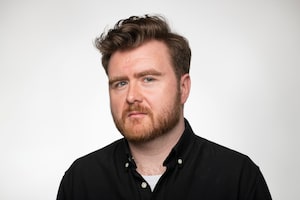
Hot Docs organizers promise an 'unparalleled celebration of non-fiction storytelling' for its coming season, but off-screen intrigue surrounding the leadership and staffing of North America’s largest documentary film festival is garnering attention.Christian Pena/Courtesy of Hot Docs
One day after it announced its artistic director had left his post, and two days after a number of its programmers resigned en masse, the Hot Docs Canadian International Documentary Festival announced its full 2024 lineup at a press conference in Toronto on Tuesday morning.
And while Hot Docs organizers promised an “unparalleled celebration of non-fiction storytelling on a global scale,” the off-screen intrigue surrounding the leadership and staffing of North America’s largest documentary film festival was the featured drama.
“There are times we have not taken care of our people,” Hot Docs president Marie Nelson told a gathering of media and film industry people at the festival hub, the Hot Docs Ted Rogers Cinema. “There are times when we have been more concerned with change than making sure that our people are taken care of, and when you do that you end up in the situation that we’re in right now.”
Nelson, an ABC News and PBS veteran who succeeded long-time Hot Docs president Chris McDonald less than a year ago, finds herself leading a festival in financial difficulties and rocked by staffing upheavals.
On Monday, Hot Docs organizers said Hussain Currimbhoy had stepped down as the festival’s artistic director on March 20, just four months after his appointment by Nelson. Currimbhoy, a Toronto-born producer, director and film curator, is the former director of investment and global strategy for the Chicago Media Project, where he also led a program to boost the works of marginalized filmmakers.
Managing director Heidi Tao Yang said in a statement that Currimbhoy left the festival for “personal reasons,” calling him “fundamental in programming this year’s festival,” which is scheduled to run in Toronto from April 25 to May 5. Festival director Heather Haynes has been tasked with taking over programming duties for the 2024 edition.
On Sunday, Hot Docs programming staffers said in social media posts that 10 members of their team were leaving the festival. “I have made the heartbreaking choice to exit the 2024 Hot Docs festival,” departing staff wrote in separate but near-identical messages. “I will continue to fight for films and filmmakers – they are the bedrock of all film festivals, and the reason I do this job,” the posts continued.
In a longer statement shared with The Globe on Tuesday, the departing employees wrote that “the once welcoming programming environment was recently turned into a toxic workplace,” alleging that they were unheard, disrespected and saw “contracts breached across various programmes.” They added: “We were expected to work in an ever-changing, chaotic, unprofessional and discriminatory environment.”
Those leaving the festival include long-time staff members Myrocia Watamaniuk, Angie Driscoll and Gabor Pertic.
The Globe and Mail approached Nelson for comment about the statement after the event on Tuesday, but was told by a press officer that Hot Docs would not comment further on the evolving situation.
In her impassioned and allegorical press conference remarks, Nelson, who grew up just outside of Baltimore, referenced the tragic collapse of that city’s Francis Scott Key Bridge early Tuesday. She said the film community in general was “a bit unmoored,” and acknowledged that at times Hot Docs didn’t “get it right,” without getting into specifics.
Both Nelson and Haynes said that the departing programmers would be welcomed back.
In the e-mailed statement, Yang acknowledged the departures but did not connect them to Currimbhoy’s resignation. “Regrettably, some members of the programming team have decided not to participate in this year’s festival,” she wrote. “We thank them for their contributions.”
Their contributions and those of Currimbhoy’s are found in this year’s schedule of 168 documentaries, representing 64 countries and boasting 51 world premieres. Films will screen in cinemas across Toronto, including the Hot Docs Ted Rogers Cinema, the world’s only documentary-focused movie theatre.
The opening night film is Luther: Never Too Much, director Dawn Porter’s portrait of American R&B singer Luther Vandross. It is one of 32 international premieres (the first screening outside the country of origin), and it is part of a new Pop/Life program focusing on music and musicians.
Others in the six-film series are Beethoven’s Nine (on the 200th anniversary of Beethoven’s final completed symphony), Disco’s Revenge (about the music’s complicated history), Swamp Dogg Gets His Pool Painted (featuring the lovably eccentric musician), Teaches of Peaches (on the boundary-pushing electro artist Peaches) and Eno (about the visionary British musician).
Eno, directed by Gary Hustwit, was created using AI and is different every time it’s shown. “It’s a film that I believe can reach a broad generation of audiences,” Hot Docs’s Haynes said in an interview with The Globe. “The technology the director is using in this doc can hopefully hook younger generations as well.”
Another new programming strand, Emergence, highlights stories involving technology. Love Machina follows a couple’s commissioning of an “AI mindfile” in order to extend their romance into infinity.
The previously announced Special Presentations slate includes the world premiere of Red Fever, in which Montreal-based Cree filmmaker Neil Diamond explores the world’s fascination with Indigenous North Americans. Emmanuel Reyé's Le Mans 55: The Unauthorized Investigation is a deep dive into a nightmarish 1955 French race that became the deadliest in the history of motor sport.
Immediately after the press conference, about 75 people demonstrated outside the Hot Docs theatre, protesting against the festival’s major sponsorship from the Bank of Nova Scotia, which owns a stake in Israeli arms company Elbit Systems Ltd. through funds managed by a subsidiary. In an interview, No Arms in the Arts campaign spokesperson Michael DeForge said that Scotiabank’s arts sponsorships “paint a progressive, humanistic image on the back of investing in the arms trade.”
Since COVID-19, the film industry has struggled to draw moviegoers back into theatres. Earlier this month, Nelson went public with her concerns about the festival.
“We find ourselves dealing with significant operational challenges – so much so that it puts the sustainable future of the organization on quite shaky ground,” she told The Globe.
Hot Docs has adjusted its structure this year, with films more tightly categorized. For example, Artscape, a broad heading from last year, has been dropped. “We’re paring down some of the programs in a more specific way,” Haynes said. “The hope is that audiences can find the films they’re interested in more quickly.”
There are also fewer films compared with last year’s 30th anniversary edition, and single ticket prices have increased $1.
Ultimately, film festivals and other presenters are banking on the communal experience of watching movies in a theatre.
“We went through COVID, and how much did we binge watch alone?” Haynes said. “Now we have this opportunity to come back and experience something together. I think it’s a gift that we cannot afford to lose.”
 Brad Wheeler
Brad Wheeler Josh O’Kane
Josh O’Kane